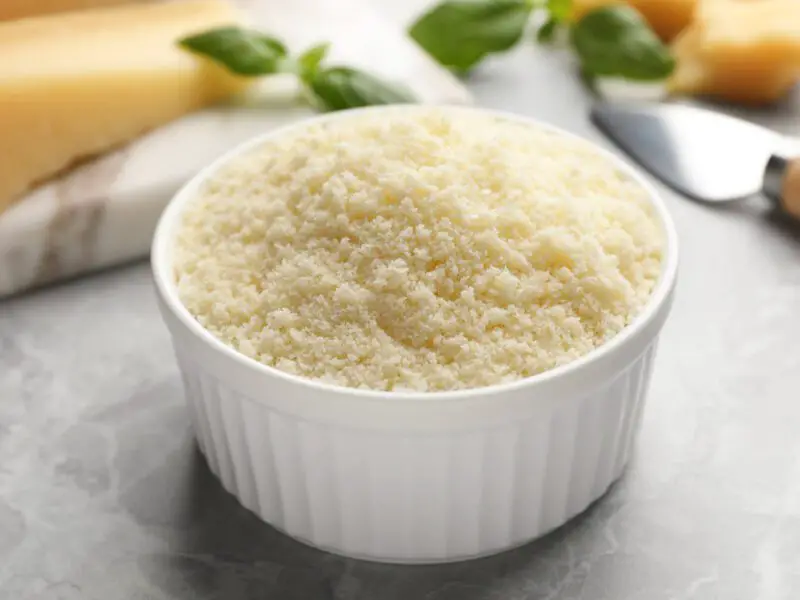If you’re anything like me, your love affair with grated Parmesan cheese knows no bounds. Whether it’s sprinkled generously over a steaming plate of spaghetti, lovingly layered onto a slice of pizza, or sneakily snacked on straight from the container (no judgments here), grated Parmesan cheese adds a burst of flavor to almost any dish. But here’s the million-dollar question that’s been haunting the cheese aisle at your local grocery store: does grated Parmesan cheese need to be refrigerated?
Hold onto your cheese graters, dear readers, because in this deep dive into the world of grated Parmesan, we’re about to unravel the mysteries of cheese storage, cheese preservation, and everything in between. So, let’s embark on this flavorful journey together, and by the end, you’ll be a certified Parmesan cheese storage expert!
Grated Parmesan Cheese: A White Knight of Flavor
Grated Parmesan cheese, often found snugly tucked into a plastic tub, is a pantry essential. It’s like that trusty friend who never fails to liven up a meal. This grated variety boasts a near-white hue and is the cheese most commonly found in supermarkets. Its shelf life is relatively generous, but the way you store it can make all the difference.
Do I Need To Keep Grated Parmesan Cheese In The Fridge?
For unopened containers of grated Parmesan, the verdict is clear: they’re comfortable in the fridge and can last there for up to two months. It’s like a cozy winter sweater for your cheese, keeping it fresh and flavorful. But here’s the twist – once you crack that tub open, the clock starts ticking, and your cheese will only maintain its prime condition for about four weeks. If you spot any mold setting up camp on your cheese, it’s time to bid it adieu.
Wedge Wonder
Now, let’s talk about Parmesan cheese in its wedge form, the way it’s often seen in Italy. These wedges come in varying shades, from deep yellow to pale white, and boast a more crumbly texture compared to their pre-grated counterparts.
Unopened Parmesan cheese wedges, if kept in the fridge, can stand their ground for up to six months. But (and this is a cheesy but), once you take the knife to them, you’ll want to use them within two weeks. Just like with the grated version, if mold comes knocking, show it to the door.
So, what happens if you decide to break up with your fridge and let your grated Parmesan cheese run wild?
What Happens If You Don’t Refrigerate It?
Now, you might be thinking, “Hey, it’s just cheese! Does it really need a special place in the fridge?” The answer is a resounding yes, and here’s why.
If you choose to let your grated Parmesan cheese roam free without the cozy shelter of your refrigerator, it’ll eventually go rogue. The cheese will lose its moisture, becoming dry and hard, and its flavor will begin to fade away. Without the magic of refrigeration, grated Parmesan cheese can soldier on for about a week. After that, it’s best to send it off to cheese heaven.
But do you really want to toss out the potential for an extra zing in your pasta or pizza? I didn’t think so! Refrigeration is the superhero cape your Parmesan cheese needs to keep it fresh and fabulous. It’s like a spa day for your cheese – it’ll thank you with bursts of flavor in every bite.
How Do You Know If Grated Parmesan Cheese is Spoiled?
You’re probably wondering how to tell if your grated Parmesan cheese has gone over to the dark side. Don’t worry; we’ve got your back. There are some telltale signs that can tip you off.
- Color Check: Start by inspecting the color of your cheese. If it has gone from its usual pristine white to an unsavory yellow or brown, chances are it’s past its prime.
- Sniff Test: Give your cheese a good sniff. If it’s emitting a sour or generally unpleasant odor, consider it a warning signal.
- Taste Test: When in doubt, taste it. If the flavor is off, sour, or just not right, it’s time to say your goodbyes and part ways with your beloved cheese.
Now, onto the million-dollar question – how should you keep that grated Parmesan cheese fresh as a daisy?
How Should You Store It?
Storing grated Parmesan cheese can be a bit of a puzzle, as it tends to dry out faster than you can say “Parmigiano-Reggiano.” The secret sauce to preserving its deliciousness lies in keeping it away from two sneaky culprits: air and moisture.
One nifty trick is to transfer the cheese to an airtight container right after you’ve finished grating it. It’s like a cozy blanket for your cheese, ensuring it stays fresh and delightful. Think of it as giving your cheese the VIP treatment it truly deserves.
If you’re planning to use your grated Parmesan within a few days, the Ziploc bag becomes your ally. Just pop it in, seal it, and your cheese is good to go. But, and this is a big but, if you want to prolong the shelf life of your grated Parmesan cheese, consider the freezer.
Freezing grated Parmesan cheese is a genius move. Place your cheese in a freezer-safe container and watch it maintain its flavor for up to six months. It’s like a time capsule of cheesy goodness that’s always ready to jazz up your dishes.
FAQs
Does grated Parmesan go bad?
Absolutely, grated Parmesan can go bad. The key is proper storage. If it’s tightly sealed and refrigerated, it can last for about four months. However, if it’s left to fend for itself, its flavor will deteriorate, and it might even develop mold.
Are white spots on Parmesan cheese mold?
White spots on Parmesan cheese can be a mystery. They might be mold, but they could also be something else, like harmless calcium lactate crystals. If the spots look fuzzy and have a greenish-white color, they’re more likely to be mold. But if they’re just white and not furry, chances are they’re just calcium crystals.
What happens if you eat moldy grated Parmesan cheese?
Eating moldy grated Parmesan cheese isn’t a great idea. The molds that can grow on Parmesan cheese, like Aspergillus and Penicillium, produce toxins that can lead to food poisoning. If you ingest moldy Parmesan, you might experience symptoms like nausea, vomiting, diarrhea, and abdominal cramps. Seek medical attention if you encounter these symptoms after a cheesy mishap.
How long does grated Parmesan last once opened?
When grated Parmesan is opened and properly sealed, it can keep its charm for about four months if stored in the refrigerator. But if you leave it exposed, it’ll only stick around for a couple of weeks.
Do all types of cheese need to be refrigerated?
The need for refrigeration depends on the type of cheese. Soft cheeses like cottage cheese, goat cheese, and cream cheese should definitely be refrigerated. Hard cheeses like Parmesan and cheddar, however, can survive outside the fridge but will enjoy a longer life if you let them chill. It’s like a bonus for their longevity!
Final Thoughts
So, to sum it all up, grated Parmesan cheese should be refrigerated once opened, but there’s a twist. If it’s tightly sealed and has been shielded from the elements (air and moisture, in this case), it can stand its ground at room temperature for up to six months.
But here’s the deal – cheese doesn’t last forever. It’s meant to be enjoyed and savored. And when in doubt, remember: if it smells off, tastes strange, or has taken on a less-than-appetizing color, it’s best to bid it farewell.
Grated Parmesan cheese is a flavor powerhouse that can elevate your dishes to new heights. So, treat it with the respect it deserves, store it right, and savor its incredible taste in every bite.
And there you have it, the ultimate guide to keeping your grated Parmesan cheese fresh, flavorful, and ready to rock your culinary world. Happy grating!



